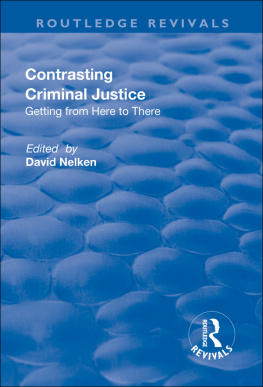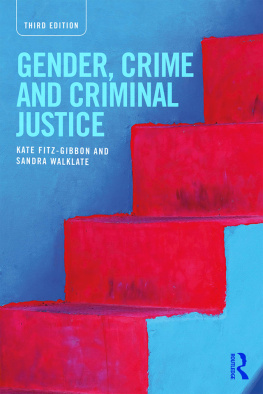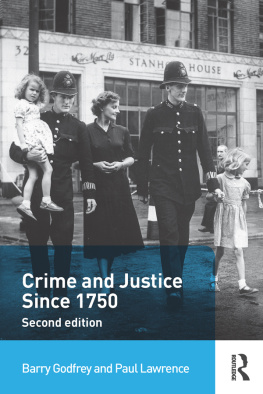comparative criminal justice
Series editors: Nicole Rafter and Paul Rock
Compact Criminology is an exciting new series that invigorates and challenges the international field of criminology.
Books in the series are short, authoritative, innovative assessments of emerging issues in criminology and criminal justice offering critical, accessible introductions to important topics. They take a global rather than a narrowly national approach. Eminently readable and first-rate in quality, each book is written by a leading specialist.
Compact Criminology provides a new type of tool for teaching and research, one that is flexible and light on its feet. The series is designed to address fundamental needs in the growing and increasingly differentiated field of criminology.
Other Compact Criminology titles include:
Comparing Criminal Justice by David Nelken
Crime and Risk by Pat OMalley
Crime and Terrorism by Peter Grabosky and Michael Stohl
Experimental Criminology by Lawrence Sherman
Compact Criminology International Advisory Board:
Jan van Dijk, Tilburg University
Peter Grabosky, Australian National University
Kelly Hannah-Moffat, University of Toronto
John Laub, University of Maryland
Alison Liebling, University of Cambridge
comparative criminal justice
making sense of difference
David Nelken
David Nelken 2010
First published 2010
Apart from any fair dealing for the purposes of research or private study, or criticism or review, as permitted under the Copyright, Designs and Patents Act, 1988, this publication may be reproduced, stored or transmitted in any form, or by any means, only with the prior permission in writing of the publishers, or in the case of reprographic reproduction, in accordance with the terms of licences issued by the Copyright Licensing Agency. Enquiries concerning reproduction outside those terms should be sent to the publishers.
SAGE Publications Ltd
1 Olivers Yard
55 City Road
London EC1Y 1SP
SAGE Publications Inc.
2455 Teller Road
Thousand Oaks, California 91320
SAGE Publications India Pvt Ltd
B 1/I 1 Mohan Cooperative Industrial Area
Mathura Road, New Delhi 110 044
India
SAGE Publications Asia-Pacific Pte Ltd
33 Pekin Street #02-01
Far East Square
Singapore 048763
Library of Congress Control Number Available
British Library Cataloguing in Publication data
A catalogue record for this book is available from the British Library
ISBN 978-1-84787-936-3
ISBN 978-1-84787-937-0
Typeset by C&M Digitals (P) Ltd, Chennai, India
Printed by CPI Antony Rowe, Chippenham, Wiltshire
Printed on paper from sustainable resources
We have to know what we are doing, protecting an order that doesnt exist, to make a security that cannot exist ... it is not possible to change anything until you understand the substance you wish to change ... to change something you do not understand is the true nature of evil. (Winterson 1991: 93, 138)
contents
acknowledgements
I should like to thank Nicole Rafter and Paul Rock for inviting me to contribute to this series and for their valuable editorial comments; Paul Roberts also offered valuable observations on the manuscript. Thanks also to Caroline Porter, Sarah-Jayne Boyd and others at Sage for all their advice and support. For anything I may have learned about this subject I owe particular thanks to my Italian friends, colleagues and students. But for the encouragement of my friends Malcolm Feeley and Stuart Scheingold I might not have come to write this book. Without Matilde and my family I could not have written it. It is dedicated to the memory of Dino Betti, partigiano and maestro.
introduction: changing paradigms
describe how established undergraduate USA textbooks deal with these issues and contrast this with the types of work found in journals, edited collections and monographs which provide evidence of the paradigm change that this area of enquiry is currently undergoing.
There is little need to insist on the wider relevance of this subject. It is impossible to open a newspaper, watch television or check the internet without coming across matters that involve comparative criminal justice. There are still very real differences worldwide in what is seen as the proper role of criminal law, in resort to criminal justice systems as compared to other forms of sanctioning, in the political independence of the legal system, in the behaviour of police, the powers of prosecutors, lay or expert involvement, the rights of victims, the use of prison or the death penalty, or the extent of trial by media. Such contrasts give rise to difficult political and policy questions. What is to be done if anything about what seem like barbaric practices in far away places? Can a society borrow reforms successfully from other places? The media in Western countries tend to magnify news of differences from and in the Islamic world. But there are also puzzling differences nearer among Western countries. How can we explain why incarceration rates in the USA are six to seven times as high as in most European countries will the use of prison elsewhere follow this lead? Why, for example, in 2008 did criminal court judges in Italy appeal to the United Nations to save them from the attacks of Prime Minister Berlusconi? Whatever answers are offered are likely to touch on genuine specificities about the current role of courts and prisons in these countries as compared to others.
As these examples also testify, however, it is getting difficult to distinguish what goes on here from what goes on there. In many countries crime is attributed to the growth of immigration indeed, in Continental Europe unauthorised migration has itself been turned into a crime that ends up occupying much of the ordinary work of the lower courts. The obsession with crime and punishment, in which a large part of the news media is increasingly taken up, not only worries us with criminality next door, but also (selectively) with that taking place in the rest of the global village. In the UK, when the tabloid Sun newspaper is unable to find a sufficiently shocking crime at home, so as to create alarm at home, it increasingly refers to events in foreign countries. But even the normally sober Independent newspaper carried a leader recently warning its readers:
the forces of terror do not respect national boundaries. And those prepared to murder and die for a perverted interpretation of Islam are not easily identified. We need to wake up to the fact that we will never be able to safeguard Britains streets totally so long as violent extremism has its base in Pakistan. (Independent, 11 April 2009)
At the same time, if crime threats come from abroad, so too do international institutions increasingly take on judicial or regulatory tasks.
If this were not enough of a challenge, there is more. There are also second-order (and higher) comparative questions to be explored (Nelken, 2007a). In order to decide how (and how far) to harmonise what they do with what others do, comparing becomes an intrinsic part of the practical tasks of many of those crafting and administering criminal justice. Thus in order to study such processes we must also explore the way others make comparisons which will often reveal the interested interpretations of criminal justice practices by politicians, policy-makers, legal actors, journalists, activists, scholars and others.








